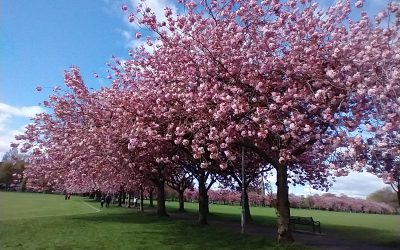A young musician announced to me recently that the problem of classical music’s dwindling audiences would be solved by moving concerts into exciting new locations not associated with classical performance.
For example, she mentioned the MultiStory project, an orchestra which performs in a multi-storey car park in the London district of Peckham. Their car park concerts have attracted large audiences. They don’t only play in car parks, but their mission is to ‘forget fusty concert halls’ as a Times review put it.
I confess that when I hear this kind of thing my heart sinks, because I know from my experience with Domus and its dome that merely providing a startling location is not enough to keep audiences faithful in the long term. I do believe in the potential of certain site-specific events, pairing a particular piece of music with a setting which enhances it – be it a cave, a warehouse, a ruined chapel or a forest. If the unexpected setting has good acoustics, so much the better. I can imagine that some settings will open everyone’s ears to new meanings.
But even if audiences like them, I do wonder whether the novelty of wacky locations is enough to sustain the musicians themselves. So much instrumental skill and dedication is required to play these very demanding, complex pieces of music: thousands of hours of practice behind the scenes are necessary. Will the musicians be motivated to put in the work if they feel the main selling-point of the performance is the novelty of its location?
The gimmick will be attractive, but what happens when the surprise has worn off? What if the orchestral sound is lost on the wind and in the din of passing traffic? What if the musicians’ hands are too cold to play? Novelty only works for a moment. After that, we need to be able to hold the audience’s attention by means of the music itself. The big question is: having enjoyed the concert in the car park or the London Underground tunnel, will listeners be inspired to follow the musicians into the conditions in which they prefer to perform – in quiet, sheltered spaces perfect for playing and listening to music?




…not to forget the poor sound architects who have created concert halls with wonderful acoustics. I feel the ultimate solution is go back to grass roots and get everyone reading notation along with reading and maths, feeling that this is just a normal part of life. Strangely, the generation who learn pieces from apps might just be on the point of discovering this. There might be hope, but will those with the necessary skill base still be around to help? It feels like there is a lost generation (or two) in the middle. De-skilling is all around us.
I haven’t come across people learning music from apps – could you give an example? I’m intrigued that you think it might lead to a greater familiarity with notation.
De-skilling all around us – yes. But as de-skilling clearly can’t be a good thing in the long run, what will come next, I wonder?
For several years I’ve seen teenagers learning songs using apps with dots on piano keys as a guide, and there are some apps which help piano teachers to give sight reading and scales practice. I don’t use these myself at the moment but can imagine from discussion around me that this might be one way of engaging interest in notation. De-skilling is one of my greatest fears – observing it with despair almost everywhere in the processing world, it probably seems ironic I feel that notation software apps might be a good way to preserve and develop skills. What a complex situation!
I wholeheartedly agree! If classical music is to continue touching people, it needs to be primarily through substance, not gimmick. Great thoughts.
Sounds a bit like grasping at straws, doesn’t it? Though I suppose if you’re desperate, you’ll try anything. (It never hurts to try, and I could be completely wrong). Still puzzling to me is that there seems to be no let up in the number of young people who want to be classical musicians, while the number of young people who want to listen to the music has collapsed.
As one of those ‘young people’, I can comfortably say that the concert hall itself is the problem. Alternative venues mostly don’t have the frankly uncomfortable and often quite oppressive rituals, associations and conditions which your average purpose-built concert hall has.
Initiatives such as the OAE’s The Night Shift are showing the way. Take the music to the people, but at the same time, maintain that certain conditions (quietness, respect and a hunger for musical knowledge) need to be encouraged – and the trend could change.
Maintaining that the concert hall are pretty much the only space for ‘proper’ music listening will eventually relegate the art form to the pages of history, and nothing more than museum pieces.
Hardly grasping at straws.